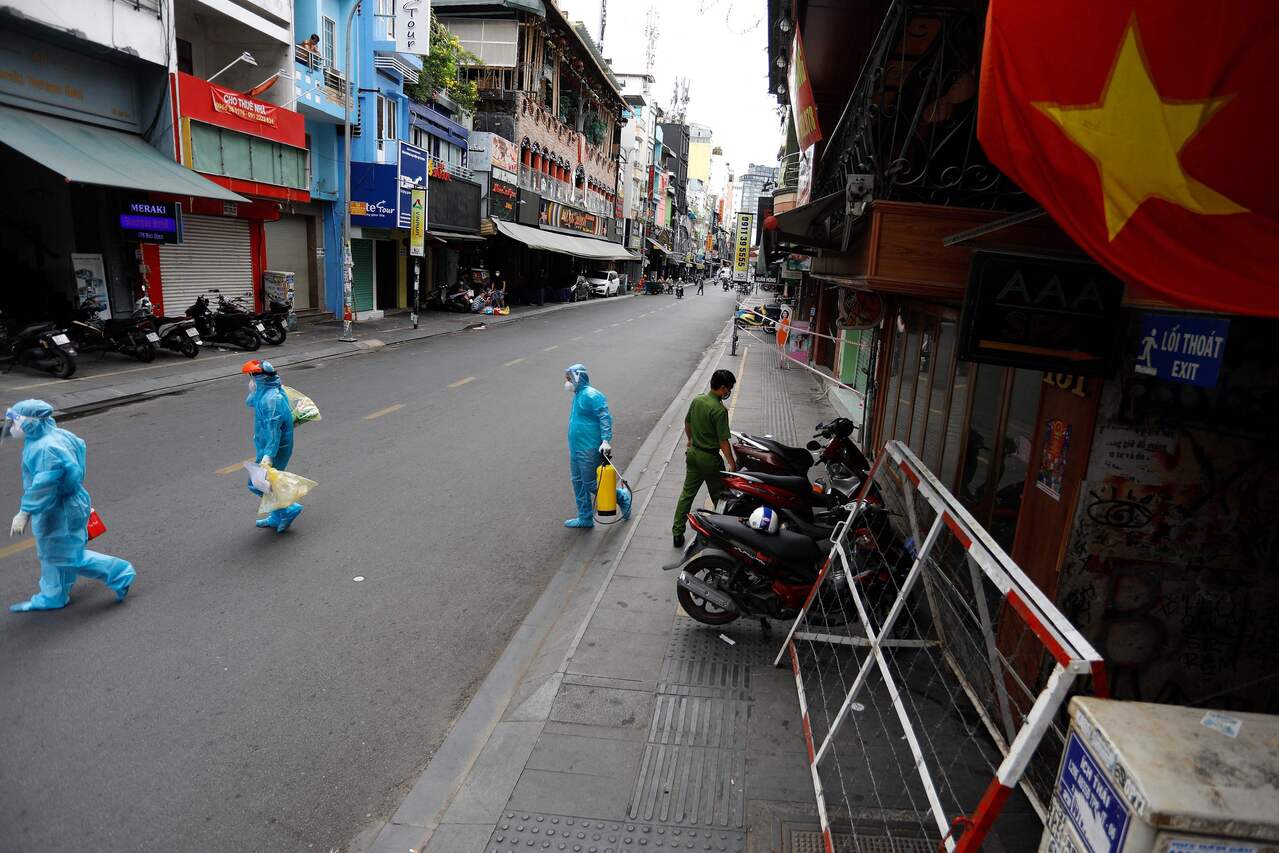News analysis
Vietnam grapples with public frustration over Covid-19 pandemic missteps and transparency
Sign up now: Get insights on Asia's fast-moving developments

Ho Chi Minh city introduced what is arguably South-East Asia's toughest movement restrictions on July 26.
PHOTO: AFP
BANGKOK - Ho Chi Minh City, the epicentre of Vietnam's current Covid-19 outbreak, introduced what is arguably South-East Asia's toughest movement restrictions on Monday (July 26).
A 6pm to 6am curfew is now in force in the city of 13 million. It was enacted one day after Ho Chi Minh City party secretary Nguyen Van Nen apologised for his administration's shortcomings, in tacit acknowledgement of the growing unhappiness about recent pandemic control measures.
"In Vietnam, leaders very seldomly apologise to the people," said Dr Ha Hoang Hop, a visiting senior fellow at the ISEAS-Yusof Ishak Institute.
But public frustration had been palpable for some time.
In contrast with the earlier phases of the pandemic, when Vietnam was widely lauded for snuffing out local transmission with aggressive quarantine, contact tracing, and stringent localised lockdowns, the authorities are now struggling to cope with the spike in caseloads caused by the highly infectious Delta coronavirus variant.
The country on Tuesday (July 27) recorded an additional 7,913 infections, bringing the total number of cases so far to 114,260 infections, with 524 deaths.
The impact of stay-home orders now in place in a third of the country has been amplified by what some locals feel are questionable measures.
With many wet markets closed to contain outbreaks, Ho Chi Minh City earlier this month also banned takeaways of food and drink, and even meal deliveries via applications such as Grab and Gojek.
Vendors unable to operate from stalls tried to survive by peddling their produce covertly in the streets. One resident quipped to The Straits Times that buying vegetables these days "feels like you are buying drugs".
Meanwhile, supply chains seized up when authorities required workers and truckers coming from Ho Chi Minh City to be tested for Covid-19 before they could enter some neighbouring localities.
Over the weekend, the city authorities were forced to address speculation after it emerged that they had allocated 5,000 doses of the Moderna Covid-19 vaccine to Vietnamese conglomerate Vingroup.
Given that the country has lagged behind its neighbours in inoculating its people - with less than 0.5 per cent of its population fully vaccinated - some wondered if the company has been unfairly prioritised.
In a press conference on Sunday, the city's deputy chairman Duong Anh Duc said that the company had been allowed to "borrow" the vaccines to administer to its employees who had been mobilised to help the authorities.
"We consider this reasonable and helpful to the city's fight against Covid-19," he was quoted by Viet Nam News as saying.
Compared with last year, when people were eager to fall in line behind an uncharacteristically transparent government in order to defeat the coronavirus, questions over the vaccine distribution policy are now clouding public sentiment.
Ms Linh Nguyen, associate director at Control Risks, told ST: "The lack of transparency has long been an issue in Vietnam, especially at local government level, which has impacted its economy and businesses. During the pandemic, any unequal vaccine distribution can be economically and epidemiologically self-defeating."
Vietnam ramped up efforts to purchase foreign vaccines only in June. Ms Linh attributed the delay partly to its political transition in February and March. On Monday (July 26), Prime Minister Pham Minh Chinh was sworn in for a five-year term.
Ms Linh said: "(Vietnam's) leaders, both from the past and incumbent administrations, lost several months of political focus on the transition instead of constructing a feasible vaccine strategy."
Amid the global vaccine supply crunch, Vietnam has made deals for Russian, United States and Japanese vaccines to be manufactured by local firms. These will take months to come on stream.
In the meantime, the authorities will have their hands full coordinating their measures, and hopefully regain the early lead it took in the region, in controlling the pandemic.


